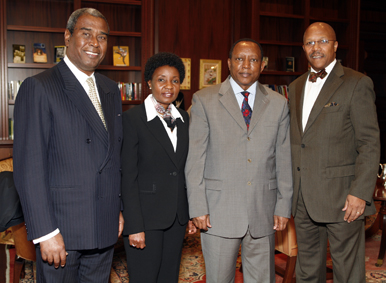Former Cape Verde President New APARC President-in-Residence
Antonio Monteiro won country's first multiparty elections

For nearly 300 years, New England and Cape Verde, the former Portuguese colony located off the western coast of Africa, have benefited from strong commercial ties. In the early 18th century, American whaling ships recruited workers from the cities of Brava and Fogo to assist with their hunts. Later, American ships engaged in the salt trade regularly anchored in Cape Verdean ports. Today, the majority of the 500,000 Cape Verdeans in the United States live in New England, largely in Massachusetts and Rhode Island. Now, Boston University is poised to deepen its ties with the region’s Cape Verdean population and gain an insider’s perspective on the country’s changing social, political, and economic landscape.
Boston University’s African Presidential Archives and Research Center (APARC) has announced that António Mascarenhas Monteiro, a former two-term president of Cape Verde, will spend the next two years teaching and studying at BU as the center’s newest Balfour African President-in-Residence.
Funded in 2002 by a $1 million grant from the Lloyd G. Balfour Foundation, a nonprofit that promotes educational efforts to help underserved populations, the African President-in-Residence program brings democratically elected former African leaders to Boston University for up to two years to share insights about contemporary Africa. Zambia’s Kenneth Kaunda was named the first Balfour President-in-Residence in 2002, followed by Ruth Sando Perry, of Liberia, Karl Auguste Offmann, of Mauritius, and Sir Q. Ketumile Masire, of Botswana.
Monteiro, a member of the Movement for Democracy, was elected in Cape Verde’s first multiparty elections, in 1991. Reelected in 1996 with 80 percent of the popular vote, in 2001 he chose not to run for a third five-year term.
Charles Stith, director of APARC and a former U.S. ambassador to Tanzania, says he is looking forward to the new knowledge that Monteiro’s appointment will bring.
“Cape Verde is one of eight African countries to receive sizable grants through the Millennium Challenge Account created by the Bush administration,” says Stith. “This will be an opportunity to understand the potential for that program to aid nascent democracies as they attempt to grow their economies and deliver a democracy dividend for their citizens.”
APARC recently marked its fifth anniversary with its fourth African Presidential Roundtable. This year’s roundtable used a teleconference forum — a simultaneous breakfast in Los Angeles, lunch in Boston, and dinner in Johannesburg, South Africa — to honor four distinguished leaders for their positive contributions to African-U.S. relations.
Honored were: in Boston, Asha-Rose Migiro, the new deputy secretary-general of the United Nations and former Republic of Tanzania minister of foreign affairs and international cooperation, the first women to hold the post; in Los Angeles, Bishop Charles E. Blake, Sr., pastor of the West Angeles Church of God in Christ for 30 years and founder of Save Africa’s Children, which runs more than 320 orphan care projects across 21 African countries; and in Johannesburg, Joaquim Chissano, second president of Mozambique (1986–2005) and now U.N. Secretary-General special envoy to Guinea-Bissau, and South African President Thabo Mbeki, who succeeded Nelson Mandela in 1999 after a career leading that nation’s anti-apartheid efforts.
A dozen former African presidents attended the APARC forum, as well as students from the U.S. and African colleges participating in the APARC American-African Universities Collaborative and invited guests from the business, government, and entertainment fields.